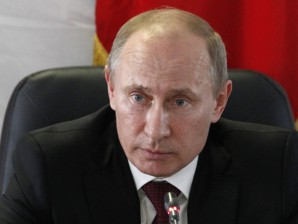
Russian leader President Vladimir Putin. AP FILE PHOTO
MOSCOW – Russia’s opposition went online Saturday to vote for new leaders to spearhead the drive against Vladimir Putin and regain the momentum lost since his thumping return to the presidency in May.
But hacking scuppered voting in the early hours while nearly a dozen police vans surrounded the one site in Moscow where Putin’s foes could get help using computers to vote – a security measure they saw as a form of pressure.
More than 200 candidates fielded by Russia’s splintered protest movement – from ex-chess king Garry Kasparov to regular students and activists – are vying for one of 45 seats on the so-called Coordinating Committee.
Internet voting was due to have been conducted nationally on the cvk2012.org website after more than 165,000 people registered online.
But the site became unresponsive as soon as elections began in Moscow at 8:00 a.m. (0400 GMT) and only resumed periodic service hours later.
Organizers said their site was the victim of a distributed denial of service attack (DdoS) attack that opposition forces have blamed in the past on pro-Kremlin youth groups that wage Internet war against the opposition.
“Oh how they do love to fear elections,” top opposition leader Alexei Navalny tweeted in reference to the Russian authorities and their supporters.
The highly symbolic poll’s sole purpose is to inject new energy into a protest movement that has lost steam since last winter when it appeared to pose the first serious challenge to Putin’s 13-year rule.
The very fact that the election is being held at all has returned many of the protest leaders to Russia’s news pages and led to heated debates among the social network-savvy hipsters who form the opposition’s largest constituency.
The young crowd’s spirits have been flagging because the rallies they have attended since Putin reclaimed power have dwindled ominously in attendance – a sign to many that the movement was quickly becoming a spent force.
Protest organizers conceded they needed new leaders more closely connected with the opposition rank-and-file.
A handful of special polling stations with computers for those who lacked access were also set up in Moscow and a few other large cities that have been the focus of most opposition activity in recent months.
But the Internet-only voting has generated almost no interest in the provinces and few Russians nationally seem to be aware of it as the state media continue to devote their attention to Putin and his daily affairs.
Organisers said agents from the ex-KGB Federal Security Service (FSB) searched their polling booths in the central industrial town of Chelyabinsk and temporarily denied people the right to vote.
Meanwhile, dozens of police officers patrolled the polling station that opened in the heart of Moscow in case of an unsanctioned rally.
“Yesterday, the Kremlin political analysts were telling us how little our elections mattered. And today FSB agents are visiting our polling station,” current committee head Leonid Volkov tweeted.
Voting is due to end Sunday at 1700 GMT.